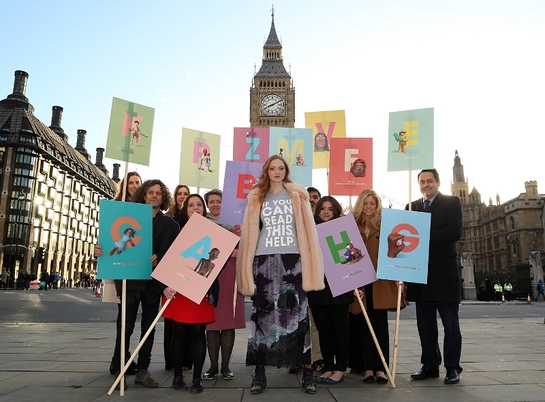International actress, activist and businesswoman Lily Cole yesterday gave a speech to British politicians and American embassy representatives at the United Kingdom Houses of Parliament calling for urgent action to tackle the global illiteracy crisis, which afflicts one in 10 people alive today and means that one in four American children leave primary school unable to read or write.

She unveiled the ‘Alphabet of Illiteracy’, a new body of evidence showing illiteracy is the root cause of almost every major problem humanity faces, from A-Z. The full Alphabet can be explored here, but examples, drawn from a wealth of academic research and data, include:
Gender inequality
• Women are disproportionately likely to be unable to read or write: two thirds of the world’s illiterate adults (520 million) are female.
• Each additional year of schooling a girl receives increases her earning ability by 10-20% and reduces the probability of postnatal child mortality by 10%.
Infant mortality
• Four to six years of literacy and education for women can lead to a 20% drop in infant deaths.
Female Genital Mutilation (FGM)
• In studies of female genital mutilation, more than 80% of the victims and up to 92% of mothers were illiterate and unemployed.
• Educated and literate women more often support the discontinuation of FGM than uneducated/low-educated and illiterate peers.
Radicalization
• Studies of Boko Haram’s impact in Nigeria ranked illiteracy as the second highest factor in preventing youth radicalisation.
Famous for her vocal belief in the importance of education, Cole was speaking in her role as Global Ambassador for Project Literacy – a campaign backed by 40 charities and education organizations, including UNESCO, the Bill, Hillary, and Chelsea Clinton Foundation, Microsoft and the World Literacy Foundation, convened by founding partner, Pearson.
In her speech, Lily Cole said: “In our alphabet, A is for AIDS, because if you can’t read or write you are five times less likely to understand how people contract HIV. B is for bloodshed, because the rate of violent crimes such as murder and sexual assaults is almost double among the illiterate population. C is for child brides, because if all women had a primary education, child marriages would reduce by a sixth.”
Explaining her support for the campaign, Cole said: “Illiteracy is not just a ‘developing world’ problem. It’s affecting children in the U.K and U.S, with one in four American children growing up unable to read or write. Illiteracy is also statistically related to many other global development issues. If we want to tackle many of the global challenges our world faces, we need to begin by properly addressing education and literacy.”
The research forms part of a wider campaign to raise awareness about the devastating impact of illiteracy and to encourage the United Nations to create a more measureable illiteracy target within the Sustainable Development Goals.
Dr. Dan Wagner, UNESCO Chair in Learning and Literacy at the University of Pennsylvania, said: “Literacy is a key component in achieving the UN’s sustainable development goals. Without literacy, each of the 17 goals will be limited by the inability of citizens to be sufficiently informed on key issues, and less empowered to take action. There is a strong argument that tackling illiteracy and low literacy, as a ‘foundational’ social problem, would pay greater dividends than tackling each issue separately.”
Kate James, Chief Corporate Affairs Officer for Pearson and spokesperson for Project Literacy, said: “Illiteracy is a global challenge and we all need to pull together if we are to combat its devastating impact. Our hope is that Project Literacy will provide the umbrella for a global coalition of charities, businesses, and government who together can ensure literacy helps solve some of the world’s most pressing problems.”
People can show their support by signing the Project Literacy petition at projectliteracy.com/petition. Created on behalf of the 757 million people around the world who cannot read or write, Project Literacy aims to gather one million signatures by International Literacy Day in September, when they will present it to the United Nations.
To mark the launch, Project Literacy has created a film that outlines the serious issues that lie at the core of the Alphabet of Illiteracy, which improved literacy can positively impact. You can view the short film here.





